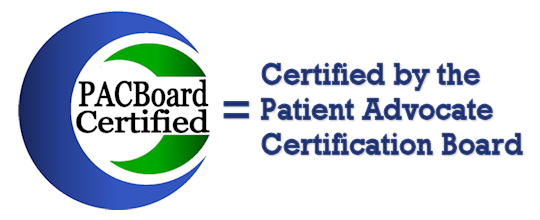What Are Board-Certified Patient Advocates And When Do You Need One?

If you’ve ever had to navigate the healthcare system on your own, did you wish for an expert by your side? What if you could hire an expert to help you resolve your healthcare issues? Those people exist. They’re called patient advocates. Some patients advocates are nationally certified. They’re called Board-Certified Patient Advocates, or BCPAs for short.
When you run into problems with the legal system, who do you call? A lawyer, of course.
When you run into problems with your taxes, who do you call? An accountant, of course.
If you have trouble with your hair, you call a hairdresser. If the wires or pipes in your house give out, you call an electrician or a plumber.
Each of these service careers is represented by skilled professionals who have earned credentials through national certification programs. When you go in search of one of these service professionals, you’ll find that many of them have earned a certification* that demonstrates their skills and qualifications. You pay for that expertise.
These sorts of certifications are provided by nationally recognized organizations that represent the integrity of the professions, making sure they adhere to specific standards, best practices, and ethics.
What’s a Board-Certified Patient Advocate?
Independent, professional health and patient advocates have been hanging out their shingles and helping patients for decades. But it has only been since 2018 that advocates had the opportunity to earn certification to demonstrate their integrity, skills, and knowledge regarding advocacy.
The Patient Advocate Certification Board (PACB) was founded to serve as the national body to certify patient advocates. The PACB creates and administers the patient advocacy certification exam and publishes a running list of people who have passed the certification exam.
When you see the initials BCPA after someone’s name, you can be sure they have passed a rigorous certification exam and have committed to uphold the ethics of advocacy.
How to choose a patient advocate
But that’s not the only way to know an advocate is qualified. Many patient advocates have been practicing for years, if not decades. Many practiced as nurses or other clinicians; others managed billing for doctors’ offices or hospitals or worked for health insurance plans. Not all of these professionals have chosen to sit for the BCPA exam, but that doesn’t mean they aren’t highly qualified to support you. So don’t rule out an advocate just because they don’t have the BCPA credential.
At the same time, you shouldn’t choose an advocate solely because they’re a BCPA. Take a holistic view of any advocate you’re considering hiring. Do they have experience with patients in similar situations to yours? Is their expertise relevant to your issues? Can you can communicate openly with them and feel you can trust them? Do their fees fit your budget? These are all important questions you should consider when choosing an advocate.
If they also have a BCPA credential, you know they have demonstrated that they have the skills, knowledge, and ethics to help you get the most from the healthcare system.

So, when you run into problems with the healthcare system, who do you call? A professional patient or health advocate! And if you can find one who has earned his or her BCPA, then you’ll have some assurance that he or she knows what’s required to help you, and will do so ethically.
To find BCPAs and other advocates in our national directory of qualified advocates.
*Don’t confuse certification with licensing. Licensing is an activity of a government – “state licensed” or “federally licensed”. Health and patient advocates are not licensed. Instead they may study, test for, and earn a certification showing they are “certified” to provide services.
Find a Health / Patient Advocate or Navigator
Learn more about AdvoConnection and The Alliance of Professional Health Advocates
